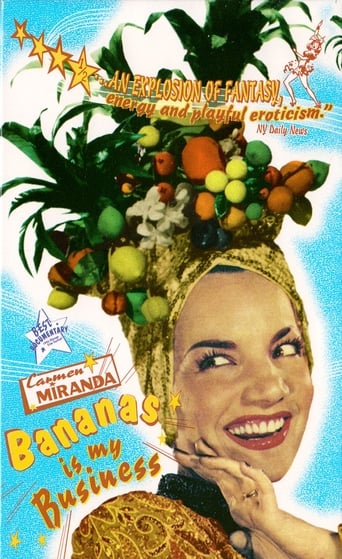TrueJoshNight
Truly Dreadful Film
LouHomey
From my favorite movies..
Married Baby
Just intense enough to provide a much-needed diversion, just lightweight enough to make you forget about it soon after it’s over. It’s not exactly “good,” per se, but it does what it sets out to do in terms of putting us on edge, which makes it … successful?
Abegail Noëlle
While it is a pity that the story wasn't told with more visual finesse, this is trivial compared to our real-world problems. It takes a good movie to put that into perspective.
Andy (film-critic)
This was a very odd documentary. Normally, I enjoy this forum of film. I enjoy learning about a person or events that I normally would never learn about. I love learning about famous people that to the normal eye would have a normal life, but behind the scenes it was nothing but trials and tribulations. The only issue I have is that sometimes it is hard to create a good documentary, or just another episode of E! True Hollywood Stories. That is exactly the line that Carmen Miranda: Bananas is my Business crosses.This film goes from decent documentary into a slime fest for the "bombshell" beauty. The problem with this film is that the filmmaker takes too many assumptions with Carmen. For example, there are some scenes that were not captured on film when Carmen was alive, so the director chose to go ahead and place an actress (or in this very odd case and ACTOR) in a reenacting role of Carmen. There were several moments of this film where it would skip from filmed Carmen, to this actor Carmen and the director would take certain risks. These risks should not be taken when creating a documentary. Why? Because again you are crossing a line. You are taking a documentary, one that lives in the world of fiction, and throw in areas of non-fiction. This cannot happen. You cannot jump genres. How is your audience to believe you? After watching some truths from the taped Carmen from her films, I had trouble jumping from one to the other. I couldn't keep track on what the director wanted to show as "real" and what was dramatized. That is definitely no way to create a story. For example, we open this film to Carmen walking around in her bath robe and suddenly falls, we witness the mirror that Carmen is carrying shatter in front of her. Now I know that the director was trying to show that a beauty, concerned most about her appearance, had a mirror (the sheer instrument of vanity) break in front of her. BUT THIS NEVER HAPPENED. I had to remind myself that the director was taking a chance here, causing my stomach to go down south. Can directors of documentaries take these chances? Can they dabble the line between fiction and non-fiction while trying to tell a "true" story? My answer friends, is NO. But again, all I am is a mere critic, no director of documentaries. Grade: ** out of *****
Lynn (dreamerlyn)
As someone who only knew of Carmen Miranda as a caricature in cartoons and a Halloween costume worn by friends, I found this film very enlightening. Whatever might be missing in the film about the deeper details of her life, it is still an eye-opening documentary that at least shines some light on a real person behind the character. I thought this was a very respectful documentary and perhaps purposefully restrained for that reason. Maybe more could have been done, but I for one am glad that at least this much was there for me to see. I have a new respect for Carmen Miranda and find that I'm motivated now to seek more about her on my own.
Irving Warner
For starters, I learned much about the Queen of Kiche; also, I learned that she was worthy of a documentary, certainly. Her beginnings in Brazil, her birth in Portugual, this section of the documentary was well done. Clearly this was the strongest section, including how she linked her fame to superfame in the U.S.. She was a Brazilian superstar long before she went to the U.S. Once in the U.S., up she went within weeks, into Celebrity Heaven. But from there, the documentary does become somewhat hazy, creating more questions than it answers. I do agree with one ImDB reviewer: They, like me, wonder how much of a struggle >did< she make, i.e. to break away from the "living cartoon" caricature she'd become by 1944/45? I mean, that was an "out there" demeaning image, and extremely limiting for a singer/dancer. This issue does not come into focus. I found the wistful, spacy narration of the director/producer somewhat pretentious, but at times it worked for me. Yes, I too agree (with another reviewer) that her marriage to the meatheaded producer just rather popped up and hung there. But, I got the impression, that time limitations lock-stepped them into going light on that. She was a serious, family oriented Roman Catholic, and that rules out divorce--and that point is covered. When Ms. Miranda died (1955) divorce wasn't even allowed in major Catholic countries! Dumping Meathead just would have been, to her and family, not an option. Finally, she made choices--she had choices. Some of these are not explained well enough. But, all in all, I don't consider this a weak effort, but a good one. Worth viewing.
milesyao
As a lover of Brazilian culture, I was rather disappointed by the film, which turns out to be a rather conventional 90's showbiz bio.Yes, Carmen was exploited and broken behind that headdress. The film did a good job of bringing out the pathos - butthat's hardly a surprise.The problem is, having done that, it didn't go any further in showing us the real woman behind the mask. The film projects her as nothing but a helpless victim of Hollywood, when her early life clearly indicated a strong and wily character. She must have put up a few fights - both internally and out there - and _this_ is the fascinating stuff. Remember that she was financially independent and emotionally not alone. Although in exile, she was always surrounded by family and, quite often, other Brazilian expatriate friends (among them one of the fathers of Bossa Nova, Vinicius --). She had choices. She didn't have to end that way and yet she did -- chose to marry an American brute and chose to leave Brazil again, right out of convalescence. This is the true mystery, and this film brings us no closer.In the other direction, the film also failed to place Carmen in context of the development of Brazilian music. Was she a true artist, or merely a star - co-opting music of the poor for the consumption of a more respectable audience? And what is her true legacy as Brazil's "cultural ambassador"? Brazil may have rejected her, but it has never forgotten or ignored her (the funeral scene proved that). Yet once again wehad no idea what Carmen means to an average Brazilian today.Watching this film, I kept getting reminded of Edith Piaf. Like her, Carmen's life has enough paradoxes for two or three movies. Regrettably, we are given less than one.

